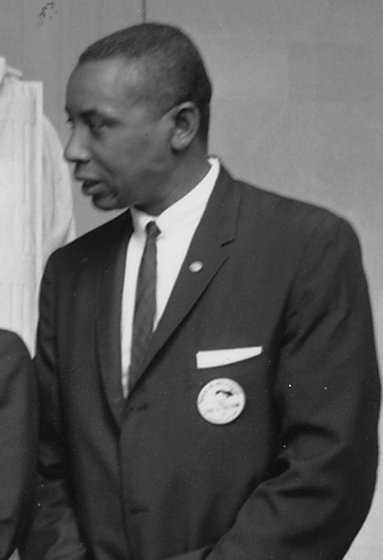Summary | Excerpt | Reading Guide | Reviews | Beyond the Book | Read-Alikes | Genres & Themes | Author Bio

A Novel
by Nicola YoonThis article relates to One of Our Kind
As Jasmyn Williams and her husband King arrive in the fictional Black utopian suburb of Liberty, California in Nicola Yoon's One of Our Kind, Jasmyn reminds her husband "that Black utopias ha[ve] been tried with little success before." She names two examples of real-world short-lived utopian experiments: Allensworth and Soul City. While there have been many other historic Black communities, these two cities were intentionally utopian in ambition and design.
.jpg) Allensworth, California: Allensworth was founded in 1908 in California's Central Valley by Lt. Colonel Allen Allensworth, with the aim of creating a place where, as Brennon Dixson writes for the Los Angeles Times, "Black residents could prosper free from racist ideologies." The town, which attracted new residents from across the country, boasted the first free circulation library in Tulare County, as well as its own school system, post office, Women's Improvement League, glee club, and train station — a stop on the Santa Fe line. Allensworth had aspirations to open a college serving Black students, a "Tuskegee of the West" that could drive economic and cultural growth in the region. He imagined a place "where African Americans would settle upon the bare desert and cause it to blossom as a rose."
Allensworth, California: Allensworth was founded in 1908 in California's Central Valley by Lt. Colonel Allen Allensworth, with the aim of creating a place where, as Brennon Dixson writes for the Los Angeles Times, "Black residents could prosper free from racist ideologies." The town, which attracted new residents from across the country, boasted the first free circulation library in Tulare County, as well as its own school system, post office, Women's Improvement League, glee club, and train station — a stop on the Santa Fe line. Allensworth had aspirations to open a college serving Black students, a "Tuskegee of the West" that could drive economic and cultural growth in the region. He imagined a place "where African Americans would settle upon the bare desert and cause it to blossom as a rose."
That vision, however, never came to fruition. The possibly racist decision to divert the Santa Fe line to a nearby white settlement in 1914, shortly after a devastating drought that decimated the area's supplies of drinking water, put a halt to Allensworth's development. By 1973, the town could no longer be found on maps. Its historical center is now a State Historic Park, and during June, in honor of Juneteenth, Amtrak runs a commemorative train to Allensworth for special tours, storytelling, entertainment, food, and a celebration of the town's history.
 Soul City, North Carolina: This more recent Black utopia was founded in 1969 by Floyd McKissick, on the site of a former slave plantation, with the intention of reversing the mass migration of Black people away from the South and into often economically depressed areas of northern cities. An early promotional brochure touted it as "A city without prejudice. A city without poverty...A brand new shining city."
Soul City, North Carolina: This more recent Black utopia was founded in 1969 by Floyd McKissick, on the site of a former slave plantation, with the intention of reversing the mass migration of Black people away from the South and into often economically depressed areas of northern cities. An early promotional brochure touted it as "A city without prejudice. A city without poverty...A brand new shining city."
Although McKissick, a civil rights leader, always intended Soul City to be racially integrated but built on a foundation of economic equality, the national media painted it as a step backwards from Black progress: "How terribly tragic it would be should all civil rights roads cut in the past twenty years lead to Soul City—a Camelot built on racism," wrote one southern newspaper.
Despite a promising early start, with rapid growth fueled by seemingly unlikely financing from the Nixon administration, Soul City's development was repeatedly stymied by white developers, politicians, and financiers who failed to offer the same level of support received by other (white) planned communities who also benefited from Nixon's loans. By 1979, the federal government had withdrawn its support, and Soul City stopped in its tracks, with only 120 residents rather than the intended 50,000. Now, more than 40 years later, Soul City is something of a ghost town, though some hope that a thriving community, established on principles of economic justice, might yet be built using the infrastructure McKissick and his collaborators created.
Lt. Colonel Allen Allensworth, from Battles and Victories of Allen Allensworth, via Wikimedia Commons
Floyd McKissick, detail from Civil Rights March on Washington D.C. in 1963, via Wikimedia Commons
Filed under Places, Cultures & Identities
![]() This article relates to One of Our Kind.
It first ran in the June 19, 2024
issue of BookBrowse Recommends.
This article relates to One of Our Kind.
It first ran in the June 19, 2024
issue of BookBrowse Recommends.
Talent hits a target no one else can hit; Genius hits a target no one else can see.
Click Here to find out who said this, as well as discovering other famous literary quotes!
Your guide toexceptional books
BookBrowse seeks out and recommends the best in contemporary fiction and nonfiction—books that not only engage and entertain but also deepen our understanding of ourselves and the world around us.